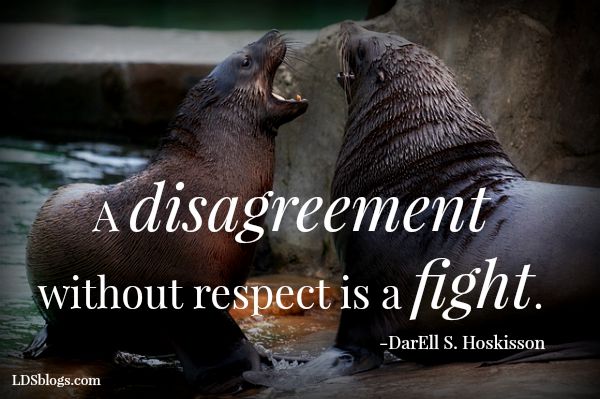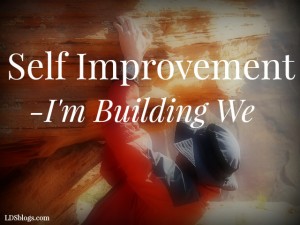Have you ever been part of a group with too much agreement, a zombie world? A group with too much “respect for authority” is in mental shut down. One person is making the decisions and everyone else just seems to follow. In business and other walks of life, it is a recipe for disaster. This is how really big group mistakes happen. As team members, we have to have respect for authority so that the team machine can move forward efficiently. But, we also must think for ourselves and disagree at critical times. As leaders, we need the benefit of all the different perspectives and experience in the group. We want concerns all out on the table, early, so we can prevent and solve problems before the group starts onto a sinking ship. Is it possible to do both? Is it possible to be respectful and cooperative while disagreeing?
Should disagreement be allowed?
“She pushed me,” my son announces at top volume in the middle of the house. “She” of course announces, “I did not.” And their mouths are off and running full steam while all productive activity slows and stops as more and more family members are disturbed and distracted. The smallest tattle in public can create a cyclone of words that pulls the whole family off task.
This kind of disagreement is totally non-productive. Arguments, especially in public, are often offensive, distracting, and inconclusive. They are time-wasters. It is very easy as a parent or leader to insist that it stop and people get back to work, because in general, nothing is going to get solved like that. It might be tempting to think disagreement itself is the problem.
 But, disagreement is important. If a family or organization does not allow it, they are robbing themselves of the benefit of engaged, thinking, unique individuals. So many companies seem to want a robot person who can teach the lesson as written, answer the call as prescribed, and just follow directions exactly. Organizations that reward and encourage automatons might get the job done, but they lose the growth potential that comes with allowing disagreement.
But, disagreement is important. If a family or organization does not allow it, they are robbing themselves of the benefit of engaged, thinking, unique individuals. So many companies seem to want a robot person who can teach the lesson as written, answer the call as prescribed, and just follow directions exactly. Organizations that reward and encourage automatons might get the job done, but they lose the growth potential that comes with allowing disagreement.
In my opinion, any organization that limits the growth of the individual, is also limiting itself. We have to allow disagreement so that individuals’ thoughts, ideas, concerns and problems can come to light. Often these are the very ideas that groups pay money to consultants or create customer surveys to find out. If people are free to disagree, the world of thought opens up.
As Eldridge Cleaver said, “Too much agreement kills a chat.”
When to disagree
Right after your boss just outlined the new plan for the exciting new product is not necessarily the moment to publicly point out all the flaws in his design. Embarrassing or deflating people, including criticizing the leaders or the plan in public is not helpful. I think people who do this have lost sight of a few truths: 1. We are on the same team! 2. Leaders are people, too. Why is it so easy to forget that people in authority are not the enemy? Perhaps because the individual does not feel valued and heard? Is authority likely to listen and welcome criticism and disagreement presented in this way? 3. Not many people enjoy or can appreciate public humiliation.
On the other extreme, we have Esther’s example in the Bible. She proposed a meal that she prepared just for the opportunity to present her opposing view to the king. I love how she delicately introduced the subject and artfully demonstrated the truth to the king, a truth he could not see. The king needed Esther’s opposing view to prevent a great mistake. The timing was crucial and saved a whole nation of people.
But, we should not have to hold a banquet every time we need to disagree. Wise leaders are not like Cicero who assumed, “while they are quiet they approve, while they permit me to speak they vote, while they are silent they are loud and eloquent.” Respectfully allowing someone to speak is not necessarily agreement. As leaders we must ask for concerns and ideas and set up appropriate times, places, and spaces for these upsets to be resolved in positive ways.
 In general, disagreement is most welcome when asked for or in the planning stage before the team is moved into action. But many times leaders do not think to ask for input before the production or performance begins. Team members are often not aware of the plans until they are already being directed to act. Some problems only surface during the process. What then?
In general, disagreement is most welcome when asked for or in the planning stage before the team is moved into action. But many times leaders do not think to ask for input before the production or performance begins. Team members are often not aware of the plans until they are already being directed to act. Some problems only surface during the process. What then?
How to disagree
Immediate opposition is usually unwelcome. Especially if you have a very authoritarian leader, any disagreement will likely be viewed as disrespect, back talk, or worse, disloyalty. In any conflict, it is very important that the person first understand that you are on their side, not an opposing side. This was so exciting for me to understand and discover.
I had made a total mess of things. In spite of my efforts to cooperate with the young mens leader (I am young women leader for girls ages 12-18), we had in fact not supported our group activity, and we did not accompany the young men to the baseball game. I had several problems and concerns that didn’t get worked out in time, and I decided not to go since I would have been the only female leader of the group. But, it looked like I was not playing fair. I looked uncooperative. I started out in an email trying to explain my position and point of view. Instead of helping, it took our relationship into a nose dive. In this tail spin, I called my dad. He taught me:
“Show him that you are in the same boat.”
My “excuses” did nothing to assure him that we were on the same team. It sounded just like…excuses. But we did, in fact, have many of the same purposes. We both wanted to work together. We both had the same stresses involved to get the cooperation of both our other team leaders and the youth. We all wanted to have a successful activity and model for the youth how to work together. It really was not hard to switch my approach and start with what we had in common. Even if we have different ways we hope to reach group goals, usually we have shared purposes. My dad helped me see that I had to start from a position of agreement.
Most people can listen to a friend. Few can even hear an enemy.
“Talk in person”
My father taught me to talk to the person face to face. This was really tough to do, especially because I felt I had let him down, but it was the right way to handle it. In person we can read others’ emotions, sincerity, and tone of voice. The other knows the relationship is important to you because you took the time to speak in person. It also shows the importance or value you place on the issue or disagreement when it is delivered in person.
Schedule it
For many people, especially leaders, time is precious. Most people do not appreciate interruption of their plans or activities. For people who live by the clock, you have to schedule it or you won’t get an audience at all. For more flexible individuals, make sure it is a good time for them before you flood them with a thirty minute explanation. I have found it really helpful to actually practice my ideas or concerns verbally on a family member or friend who is willing to listen. This helps me condense my ideas and be able to verbalize them more succinctly. Busy people appreciate it when you can clearly and quickly get to the point.
Follow Procedure
 It doesn’t help the company if you “practice” verbalizing your concerns to everyone but the person who is in charge or who can actually resolve the concern. This really just amounts to gossip. Most organizations have a procedure for submitting ideas or concerns. Find out what that process is. In a college class of over 300 people, my teacher requested that we put our suggestions on the back of a test sheet. I submitted my suggestion in this way and was very pleased when the teacher honored my request. We can submit our opinions to our senators and representatives by calling their office. We can vote. It pays to find out how to “vote” correctly so your position is “counted.”
It doesn’t help the company if you “practice” verbalizing your concerns to everyone but the person who is in charge or who can actually resolve the concern. This really just amounts to gossip. Most organizations have a procedure for submitting ideas or concerns. Find out what that process is. In a college class of over 300 people, my teacher requested that we put our suggestions on the back of a test sheet. I submitted my suggestion in this way and was very pleased when the teacher honored my request. We can submit our opinions to our senators and representatives by calling their office. We can vote. It pays to find out how to “vote” correctly so your position is “counted.”
Speak In Private
It never ceases to amaze me how in murder mystery shows the next victim always confronts the killer in person and in private. This is a great way to die. If we need to expose crime or face someone in authority with something they don’t want others to know, alone and in private is probably the worst way to go. Tell someone in authority over them, call the police, take witnesses, get a lawyer or in other ways, protect yourself. But these are extreme cases. Most people are not criminals or murderers (thank goodness).
Most people would love a friend to point out what is not obvious to them in private. We want to know about the cliff before we jump off of it and lead a bunch of others into trouble. Mistakes and oversights that can be very embarrassing to know in public, can be very appreciated in private. We all want the mustard off the tie before the important meeting rather than during it. A friend realizes a leader is just a person, too. A friend assumes the person is doing the best they can or know how. A friend helps you look and do your best. For this reason, any kind of criticism is often best received in private.
Choose your battles
No one appreciates a whiner. Save your breath for the critical moments. The time and interruption have to be worth the attention they require for all parties. No one needs mountains made out of every molehill. I have found that I often worry over concerns that never actually turn out to be problems at all. Waiting until there is an actual problem is often better than anticipating and voicing a thousand potential ones. We want to prioritize and only share concerns and conflicts that we judge crucial to success and just ignore or let the little ones go.
Cooperative, respectful disagreement?
A disagreement without respect is a fight. Fighting within our teams may get one side what they want, but everyone loses. The relationships suffer. The communication systems break down. Trust breaks down. Many are distracted, delayed or distressed by the contention. It is no wonder that so many people hate a fight. I really hate it. Even if I am not involved, who likes to see two people they love hurt each other? Truly, everyone loses.
But the opposite of a fight is not total agreement. ‘No disagreement ever’ is another way we all lose. We must have an appropriate way to own and share our individual perspectives and experience to the betterment of the group. We need checks on our individual weaknesses and blind spots. Without disagreement, we literally become “the blind leading the blind.” Getting team members to think and speak up may be just as great a challenge for some leaders as getting team members to stop arguing may be for others.
So, in a way,
the only effective way to disagree
is respectfully.
May your disagreements bless
yourself
and your teams.
Namaste,
DarEll S. Hoskisson
DarEll S. Hoskisson loves to do hard things, but not too hard. She shares her own challenges, goals and experiences as she guides you into a realistic path of self-reflection and self-improvement. She shares tips on how to find, know and trust yourself so you can decide if other’s suggestions are right for you.
DarEll has the world a little upside down—where work is play and play is work. She actually thinks other people’s problems are fun to try to solve and lights up with a personal challenge. She loves people, harmony, and excellence. She also loves useful things like tools and ideas that make work faster, easier and more fun.
DarEll married in 1993 and graduated from BYU (1995) with a bachelor’s degree in English and Secondary Education. Since then she was adopted by 5 children and has worked with many non-profits. She is currently a certified personal trainer and group fitness instructor—leading pilates and yoga at her local YMCA.
DarEll lives in Florida where she enjoys her family, nature, her work, and encouraging people to live well.
She periodically posts her poems, what she is learning, and service opportunities on her personal blogs:
https://personalabridgements.wordpress.com and https://darellhoskisson.wordpress.com




Excellent!!!!